Evolution evolves!
A new scientific understanding of evolution is emerging
Advances in biological science are leading to a striking new understanding of how organisms evolve. Charles Darwin’s ‘natural selection’ remains the principal mechanism, but which traits are favoured is partly determined by properties of the organism itself, leading to differences between species in the ability to evolve. In a much-anticipated new book that lays out the new perspective, an international team of leading scientists describe how the evolutionary process has itself evolved over time – and continues to do so.

Nathalie Feiner, Lise Meitner Group Leader at the MPI for Evolutionary Biology, has co-authored the book and explains: “This book portrays a vision of evolutionary biology that takes organisms seriously. What organisms do and how they work actually matters for their own evolution. I think the time is ripe to bring biology back into evolutionary thinking.”
The team has summarised this new vision of evolution for the public in a popular science book, called ‘Evolution Evolving’, released today by Princeton University Press.
The book describes how animals and plants adapt through cultural transmission, epigenetic inheritance or through their symbiotic bacteria. For instance, whales have cultural traditions that are driving genetic evolution, rats have been found to adapt to poisonous diets through exploiting the genes of bacteria they get by eating faeces and soil, and learned fears are reported to be inherited across generations through molecules that attach to DNA.
The perspective has already been endorsed by several leading biologists, including Harvard University’s Marc Kirschner who, while not among the authors, described Evolution Evolving as “a tour de force” and “a fascinating and original expansion of evolutionary theory”.
First author Kevin Lala, Professor of Behavioural and Evolutionary Biology at the University of St Andrews in Scotland explains: “This is an exciting time for evolutionary biology. There have been many scientific discoveries recently that challenge the traditional understanding. Phenomena that we used to think are impossible have been shown to happen, and that is making scientists think again.”
